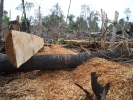
Fiber analyses prove that Ikea notebooks contain pulp from tropical forests Notebooks from the furniture store Ikea contain pulp produced by the destruction of tropical forests. This is proven by fiber analyses commissioned by the environmental organization Robin Wood. Robin Wood requests Ikea to withdraw from its product range immediately all paper products containing wood from tropical forests. Furthermore, Ikea should adjust its paper selection to 100 percent recycling paper. Ikea offers from this year on in several European countries paper products, too.
Robin Wood has taken this occasion to have the origin of the cellulose fibers of this stationery tested randomly in a specialized laboratory – and promptly made finds. In several paper products from the Ikea series Särskild cellulose fibers were found originating from the group of the so-called “Mixed Tropical Hardwood“ (MTH). This shows that trees from tropical forest areas were used in the chemical pulping process. One of the notebooks was composed to approximately twelve percent of fourteen different tropical wood fibers. "We cannot allow the last tropical forests of this earth to be reduced to pulp. IKEA must not take an active part in this overexploitation”, demands Rudolf Fenner, head of the forest unit with Robin Wood. "There is a simple and clear alternative to paper resulting from the destruction of tropical forests: Recycled paper!" Other goods from the Ikea range of stationery products also contain problematical pulp from the tropics. Concerned are the products groups Framställa (gift bags, tissue paper), Historisk (paper tags, notebooks) and Växtglädje (notebooks). They contain pulp of acacias. This tree species grows on huge plantations in Southeast Asia that were planted for the pulp industry, particularly in Indonesia. The conversion of the tropical forests into acacia plantations is still taking place there on a larger scale. Responsible companies that do not want to be associated with this destruction of forests therefore abstain from the usage of such plantation woods. IKEA, too, has specified in its code of conduct, the so-called IWAY-Standard, under section 17.4 that no wood from tropical or subtropical plantations should be used, if these plantations were established after 1994 at the expense of natural forest areas. Robin Wood has asked Ikea to present appropriate proof for the product groups Framställa, Historisk and Växtglädje and to withdraw all paper products not meeting this standard immediately from the product range as well. With the action “What is the Elk doing in the Tropical Forest?“ in the summer of 1999 Robin Wood induced IKEA to cease its sales of teak wooden garden furniture. Subsequently the furniture store committed itself to sell furniture made from high-quality tropical wood only if it is FSC-certified.


